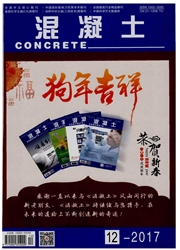

 中文摘要:
中文摘要:
针对碳化环境中的钢筋-碱矿渣研究不足的问题,探讨不同掺量的硅酸纳激发剂对矿渣砂浆碳化性能的影响以及预埋在矿渣砂浆中的钢筋钝化及腐蚀发展趋势。研究结果表明:硅酸纳激发的矿渣砂浆抗碳化能力较弱。随着硅酸纳掺量的增大,矿渣砂浆抗碳化能力相对提高。钢筋初始腐蚀时间的确定和测试方法有关:电化学法和钻孔取样测pH值法相对准确,而酚酞指示剂法存在一定的延后误差。碳化环境中,预埋在矿渣砂浆中的钢筋短时间内发生腐蚀,其中硅酸纳掺量为矿粉质量的4%和6%时,钢筋初始腐蚀时间为碳化9d;硅酸纳掺量为矿粉质量的8%和10%时,钢筋初始腐蚀时间为碳化12 d。随着碳化时间的延长,各组钢筋腐蚀速率逐渐变慢并最终停止腐蚀,表现出再"钝化"的现象。
 英文摘要:
英文摘要:
Since there were few studies on the rebar and alkali -activated slag in carbonation environment,the research was conducted to investigate the effects of different dosages of sodium silicate activator on the carbonation resistance of slag mortar, and the deactivation and erosion process of the rebar embedded in the slag mortar.The results indicate that the carbonation resistance of sodium silicate - activa- ted slag is relatively low, and increase with the dosage of sodium silicate. The test date when the erosion of rebar began was determined depending on the test method.Electrochemical method and measuring the pH value of samples obtained by drilling were relatively accu- rate, while the dates determined by phenolphthalein titration showed a delay.It was found that in the carbonation environment, the rebar embedded in slag mortar began to erode within a short time. When the dosages of sodium silicate were 4% and 6% of the mineral powder's weight,the erosion of rebar began in the 9 d of the carbonation.When the sodium silicate made up 8%and 10% of the mineral powder in weight, the rebar began to erode in the 12 d of the carbonation. As the carbonation continued, the erosion of rebar in each group gradually slowed down and finally stopped, resulting in further deactivation.
 同期刊论文项目
同期刊论文项目
 同项目期刊论文
同项目期刊论文
 期刊信息
期刊信息
